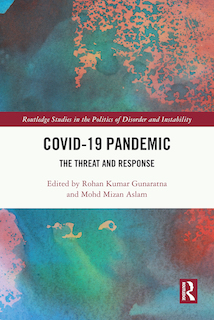"Exacerbating the Pandemic? Assessing The Critical Role of Religious Congregations in Indian Subcontinent"

ABSTRACT: The Coronavirus pandemic has exposed myriad vulnerabilities of the modern world, severely questioning the so-called human progress in the sphere of scientific innovations and advances in the global health care system. It has also exposed the socio-religious divide and defiance within communities and lack of collective responsibilities in the face of this Covid-19 challenge. As the coronavirus spread to all inhabited continents and affected people irrespective of their colour, creed and character, obstinate and opportunistic ultra-conservative religious groups wilfully resisted and defied prescribed norms to restrict the horizontal spread of the deadly pathogen. These mainstream ultra-conservative groups or sects with different religious backgrounds observed the virus as a God-sent force, and it is playing havoc due to widespread disobedience to God and increasing human sins on this earth. These conservative religious groups, especially from Muslim and Christian communities, have invoked eschatological beliefs such as ‘Day of Judgement’ to justify it as ‘God-given phenomena’ and ‘He’ only can help humanity from this disaster. These groups and their spiritual leaders have shown highly irresponsible behaviours and sometimes wilful negligence of the virus spread through religious gatherings. The practice of collective prayers, assembly, and covert travelling have accelerated virus transmissions and compromised safety and security.
Book Description
Rohan Kumar Gunaratna and Mohd Aslam (ed), COVID-19 Pandemic: The Threat and Response, Routledge, 2022.
Critically analyzing the specific security threat posed by COVID-19 to global society, the contributors to this book offer a comprehensive and critical examination of global challenges and responses while suggesting more balanced and nuanced approaches to handling these security impacts.
The COVID-19 pandemic brought about a huge challenge to health security across the globe. Several countries were pushed into lockdown repeatedly to prevent the spread of infection. The global economy has seen a major slowdown and disruption of supply chains around the world. There have also been major implications from changes to traditional security systems as well as diverse societal change even down to aspects of daily life. The chapters in this book show that progressive initiatives have expended a mixture of soft and hard response strategies that include understanding, containing, fighting, and preventing COVID-19. They look at major sectors, including defense, trade, health, and bioterrorism, among others. In doing so, they highlight the best practices used around the world to minimize the threat posed by COVID-19’s impact.
A vital resource for security studies scholars and policymakers.
Table of Contents
Introduction Rohan Gunaratna and Mohd Mizan Aslam
1. Terrorism Amids A Pandemic, Rohan Gunaratna
2. Decoding the Global Security Threat of COVID-19, Mohd Mizan Aslam
3. COVID-19 Crisis: The Impact of Trade and Economic Contagion on Developing and Emerging Markets, Nihal Pitigala
4. Multilateralism and Global Security Post COVID-19, Thomas Wuchte & Sophie Drake
5. Health Economic Model for Developing Countries to Combat Pandemics, Ch. Nilanga Samarasinghe
6. COVID-19: An Enabler for Digital Acceleration, Rasitha Wickramasinghe
7. Exacerbating the Pandemic? Assessing The Critical Role of Religious Congregations in Indian Subcontinent, Animesh Roul
8. Implications of the COVID-19 Global Health Pandemic on ASEAN’s Security Community, Rusdi Omar & Knocks Tapiwa Zengeni
9. Terrorism and Biological Weapons, Shane Britten
10. Enhanced Terrorism and the Prospect of its use in the United States – An Update, Richard J. Chasdi